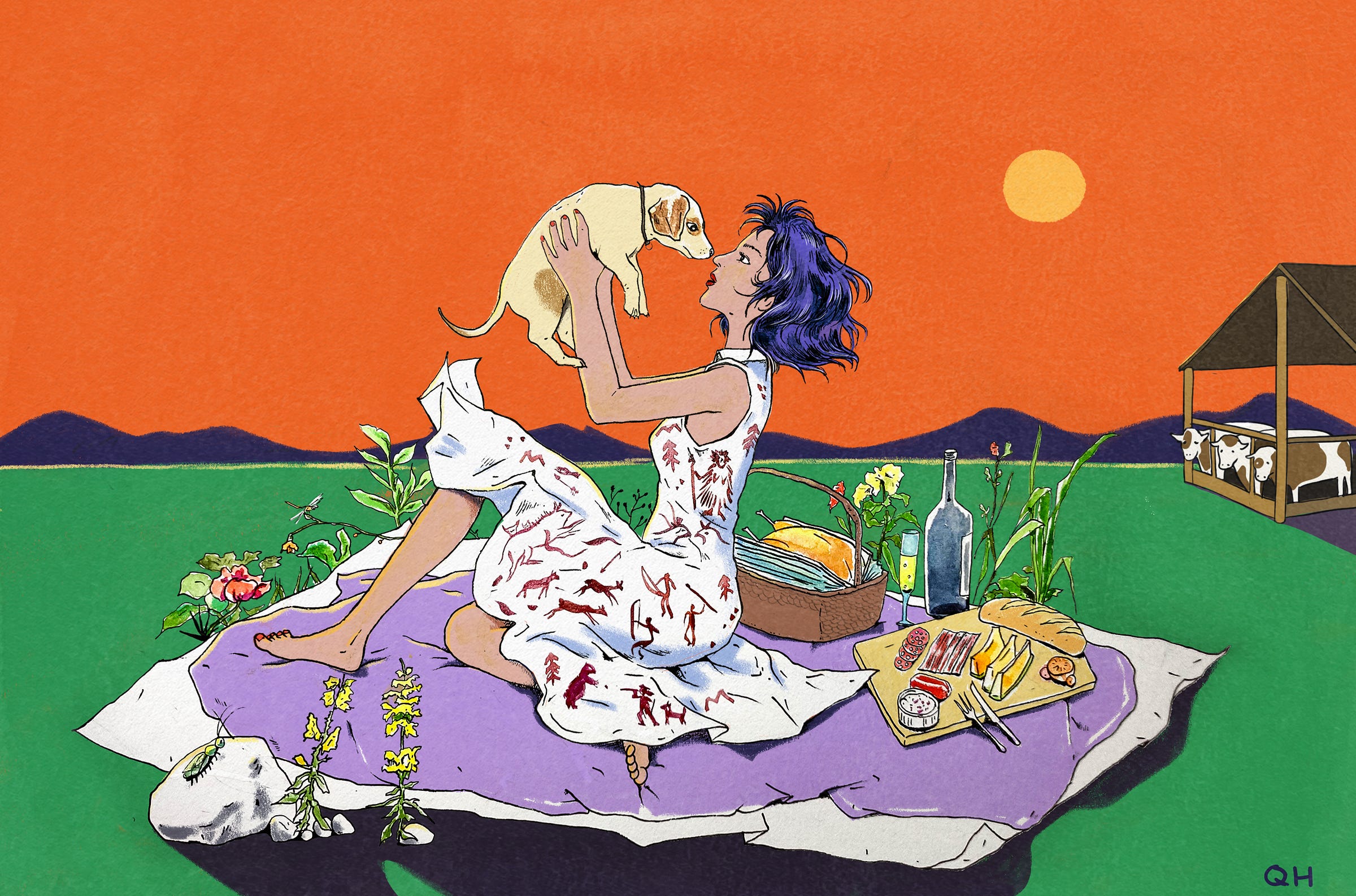Issue 10: One word—plastics.
Plus: France's baby bust, why we empathise with animals, building infrastructure faster, and more.
The latest issue of Works in Progress—our tenth—is out today. Find it here.
The issue also includes pieces on:

At the beginning of the eighteenth century, and for the previous thousand years, France was the China of Europe. For much of that time, it had a quarter of the continent’s population, and even by 1700 had four times the population of England. How differently world history would have panned out, historian Guillaume Blanc writes, if France hadn’t also experienced by far Europe’s earliest and most pervasive demographic transition, with first elites and then everyone else reducing their fertility towards just above replacement levels.
By the 20th century, France had only about as many people as England, and fewer than Germany. But such a slowdown also meant France could keep pace with a newly-industrialising England, by having fewer mouths to feed. If France’s birth rate had kept pace with England’s, there would be 250 million Frenchmen alive today.
Isn’t it weird that we love and care for animals, but also eat them? Many people would struggle to hurt animals that they readily eat. It turns out this isn’t a modern pathology: hunters around the world, whether in Western societies or living as hunter gatherers, express empathy for their prey. This is no random coincidence, argues evolutionary biologist Cody Moser. Around the world, hunters use mimicry while hunting—something that sets humans apart from practically every other hunting species. Getting into the heads of our prey made us better hunters. But we caught feelings in the process.

The power is probably out now in Nigeria — according to one data source, the power is only on for about 7 hours every day. And many sub-Saharan African countries face extremely unreliable power too. The problem is simple, says Open Philanthropy’s Lauren Gilbert: African power suppliers are prevented from charging enough for power to break even. Because they lose money when they supply power, they try to cut costs by reducing supply, keeping them bumping along until the next state bailout. To tackle this, Western NGO efforts often focus on building mini-grids off the central network. These efforts do not hurt, but it would be better to fix the underlying problem, and focus on making it possible to charge higher marginal prices and greater supply without hurting the people the caps are intended to help.
Proposals for major infrastructure projects in the UK require literally thousands of documents, totalling hundreds of thousands of pages. The same is true across much of the developed world. There is a better way, says Sam Dumitriu. We can preserve environmental protections while dramatically simplifying requirements and creating offset markets, which allow those building crucial infrastructure like electricity transmission towers and wind farms to balance out the harm they do to the local environment with improvements elsewhere.
It seems like plastics have been used for pretty much everything by now. But roads have been a bridge too far. A wave of entrepreneurship, particularly in India, is challenging this, reports Zach Caceres. Plastic roads can use up hard-to-recycle bits of plastic cheaply, replace more expensive road materials, and in their most futuristic applications, even make roads modular, with block by block replacement, off-site construction, and the ability to easily pick them up to fix pipes and thread cables.
Many people are worry about misleading content online driving belief in crazy conspiracies and other falsehoods. But most schemes to tackle these problems risk swallowing a spider to catch a fly, says Matthew Feeney, and threaten free speech, anonymity or user experiences online. What about harnessing the wisdom of crowds, Feeney asks, by embedding fact-checking prediction markets into social media?
Is Plutonium the most dangerous material in the world? That is the impression people were given in the 1970s, argues engineer Jack Devanney. But not only is it nowhere near as dangerous as people said, it is barely dangerous at all. Most of its emissions can be blocked by a piece of paper, or your skin. To do any real damage, you’d have to swallow quite a lot of it. We know this because we have experimented widely on humans, both deliberately, and accidentally. Understanding this is vital, because if we fear Plutonium, we will fear nuclear power—preventing us from harnessing one of nature’s safest and most bountiful sources of power.
Recently on our Substack: Notes on Progress
Since the last newsletter, for Issue 09, there have been four Notes on Progress articles.
The most recent announces Ben Reinhardt’s new project, Speculative Technologies—a non-profit, ARPA-style lab to create the future.
In In pursuit of Decent coffee, WIP’s Nick Whitaker tells the story of how we went from cafetieres to decent home espresso, plus functional bean-to-cup machines. More to come on that.
Ellen Pasternack wrote on science’s statistics gap—how so many young scientists are totally unprepared to do the statistics they need to do in their work, and Rosalind Arden, on whether g, general intelligence, is a ‘real thing,’—an underlying ability or just a statistical construction.
ARIA: Betting on science
ARIA—the Advanced Research and Invention Agency—is a new government-backed effort to support unconventional scientific research in the UK, headed up by Matt Clifford and Ilan Gur. We are pretty stoked about what they might achieve—which is why we filmed an interview with them in late January, so that they could explain their plans and what makes them tick. Check it out on YouTube, here.
Our site upgrade
Our brilliant designers And-Now have upgraded our site to deal with the increasingly large demands we put on it as a growing magazine. Nick explains some of the new features here. It can now present different kinds of content, like special issues and video, that we increasingly want to experiment with. If you see anything weird, send us a direct message on Twitter @WorksInProgMag.
What we’ve been up to
Saloni submitted her PhD thesis and wrote for her newsletter on recent advances in science, including why cancer death rates have declined (and much much more!)
Nick wrote the fourth highest upvoted post ever on EA Forum: EA does not own its donors’ money.
Sam wrote about how capping British individual savings accounts would worsen UK housing troubles, and put further pressure on Britain’s already-rubbish savings rate, and also about how credible commitments to cheaper electricity in the future can speed up decarbonization.
Sam also spoke at the Cambridge Union, arguing for economic growth as the “Swiss army-knife” for fighting climate change, pandemics, poverty, and more:
More from around the web
Can we build support for new wind farms by giving locals money off their bills?
Stripe Press is publishing Claire Hughes Johnson’s Scaling People (preorder available now), a guide to management in companies that are scaling quickly.
Did you know that most of Boston was claimed from the sea? See also this never-carried-out plan for New York City.
England’s infamous corn laws were established in 1815, and repealed in 1846 amid popular discontent. But an attempt to institute similar laws in 1620 was defeated, with aristocrats voting against their own immediate self interest because of their view that England was a commercial nation.
The UK is wasting a lot of wind power because it doesn’t have the grid capacity to get it to where it’s needed.
How worried should we be about falling sperm counts? More.
Sixty to seventy percent of national income still goes on labor. We have an extreme shortage of high skilled workers.
Despite the phenomenal performance of ChatGPT, financial markets are not expecting transformative artificial intelligence to appear soon.
Birmingham UK’s tram network in 1930 and today.
Lockdown showed how miserable many children are in school.
Firms are getting more specialized, raising levels of market concentration.
Lithium ion batteries have collapsed in price. Producing today’s Nissan Leaf battery costs $6,000—but would have set you back $500,000 in the 1990s.
According to the World Gold Council, Indians own 25,000 tonnes of gold, more than most central banks in the world combined!
For decades, some 40% of deaths among the Gebusi were murder. But since 1989, they have had zero homicides. How did this happen?
A brief history of parafilm, the possibly-edible favorite tool of scientists.
The best inventors innovate more if they’re allowed to migrate to the most advanced scientific clusters.
Mortality rates declined so much during the 19th and 20th centuries that the average 20 year old born in 1860 had the same risk of death as the average 60 year old born in 1940.
Has one of the most famous academic papers finding no effect of a minimum wage on employment been overturned?
Mergers can raise competition by allowing large firms to enter new markets.
See ya!
— Saloni, Nick, Sam and Ben.





